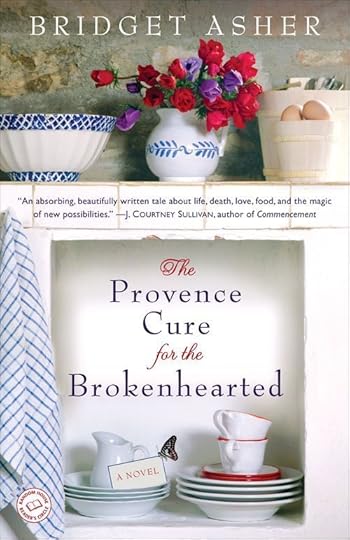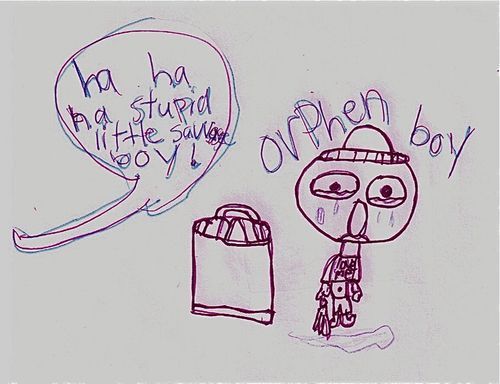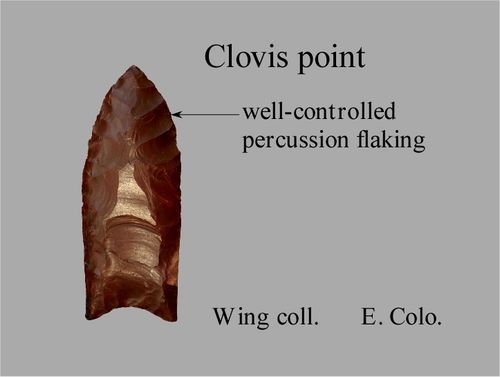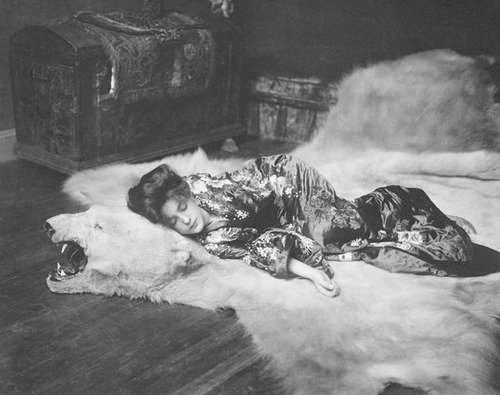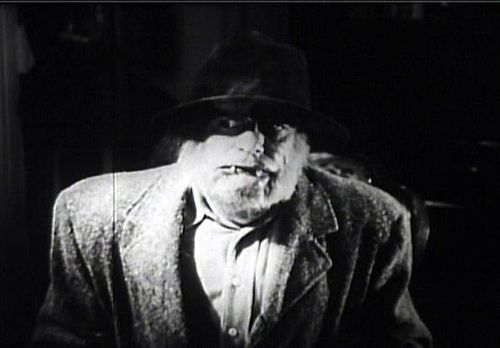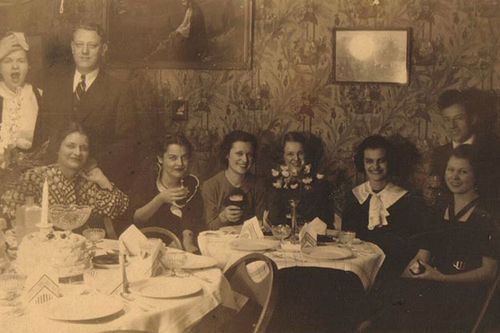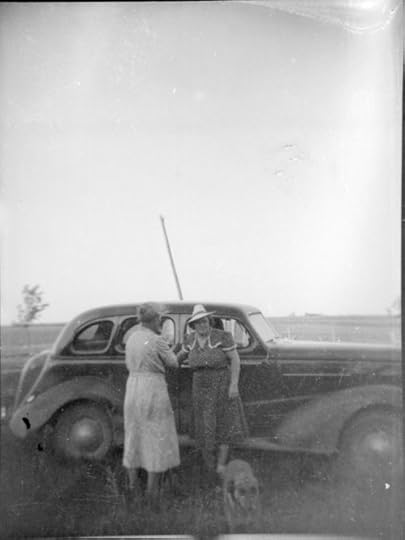Nancy Martin's Blog, page 29
March 27, 2011
Same old, same old
by Harley
 The other day, I hopped on my spinning bike and found that one of my spinning shoes, attached to the bike, had died. Cracked right down the middle, like the Grand Canyon.
The other day, I hopped on my spinning bike and found that one of my spinning shoes, attached to the bike, had died. Cracked right down the middle, like the Grand Canyon.
"What?!" I cried. "How can this be? It's not like it's old. Why, I've only had these for . . ." I did a quick calculation.
Fifteen years. My shoes, like my bike, date back to the Clinton Administration. For that matter, I've got a stair stepper bought in the early 90's, and I use it constantly. It creaks, it groans, but it works. It's a brand called Tetrix and I wish they made everything. Toasters, cars, human hearts. I cannot kill the thing. I expect my great-grandchildren will be doing their cardio workout on it long after I'm dead, recalling how Great Grandma Harley—and this may be my greatest legacy—once folded laundry while keeping her heart rate in the aerobic range while watching TV. (I call it launderobics. My children think this is an actual word and that all mothers do it.)
So I've got a stair stepper that's old enough to drink in a bar, a spinning bike old enough to vote, and while driving to the bike store for new shoes, I started thinking about my other stuff that's outlived its life expectancy. Tap shoes that have changed color 3 times. A favorite black velour sweatshirt—my "good sweatshirt"— bought in New York, at Barney's back in my soap days.  A grand piano from 1984, also my soap days. I have a t-shirt in my closet that says STUNTS, 30 years old, given to me by a long-forgotten stuntman. And a blue-black wool Navy shirt with the name "Kozak" written on the label in my mother's handwriting. I wear it all winter, every winter. It's probably my brother Joe's from his tour of duty in the 70's, although nobody knows why it's in my closet. But there's an outside chance it's our dad's, who was also a sailor, in which case it dates back to World War II. Beat that, if you can.
A grand piano from 1984, also my soap days. I have a t-shirt in my closet that says STUNTS, 30 years old, given to me by a long-forgotten stuntman. And a blue-black wool Navy shirt with the name "Kozak" written on the label in my mother's handwriting. I wear it all winter, every winter. It's probably my brother Joe's from his tour of duty in the 70's, although nobody knows why it's in my closet. But there's an outside chance it's our dad's, who was also a sailor, in which case it dates back to World War II. Beat that, if you can.
The thing is, I don't know beans about antiques and I'm not into vintage couture. Wearing some stranger's old clothes is about as appealing to me as using their toothbrushes. I like new shoes, jeans, purses—ah, purses!—as much as the next girl (unless the next girl is Lindsay Lohan) but ever since my friend Andie pointed out how obsessed we Americans are with the nouveau, the novel, the shiny, trading in gently-used cars, spouses, cell phones, I've begun to notice the things I love that are old. My watch. The paintings on my walls. My yellow sweater. My dog Fez.
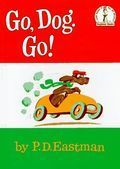 Of course, I'm preaching to the choir when I mention old books—I get weepy just dusting the bookshelves and seeing my children's baby books, crayon-covered, with missing pages: Goodnight Moon, Hippos Go Berserk, Tales of a Gambling Grandma, Sylvester and the Magic Pebble, I'll Love You Forever, What Are You So Grumpy About? Hop on Pop. Go, Dog, Go.
Of course, I'm preaching to the choir when I mention old books—I get weepy just dusting the bookshelves and seeing my children's baby books, crayon-covered, with missing pages: Goodnight Moon, Hippos Go Berserk, Tales of a Gambling Grandma, Sylvester and the Magic Pebble, I'll Love You Forever, What Are You So Grumpy About? Hop on Pop. Go, Dog, Go.
Which brings us to Daisy.
 Remember Melissa Mia Hall, our friend who died in late January? Her dog Daisy, elderly, ill, and reported to have been euthanized, turned out not to be dead after all. Daisy was rescued through the tireless efforts of two intrepid souls, Laurie Moore and Floreen. Daisy's been nursed back to health, if not youth, and this weekend was officially adopted by a friend of Melissa's in Austin, Texas. Daisy, live long and prosper. Go, Dog, Go.
Remember Melissa Mia Hall, our friend who died in late January? Her dog Daisy, elderly, ill, and reported to have been euthanized, turned out not to be dead after all. Daisy was rescued through the tireless efforts of two intrepid souls, Laurie Moore and Floreen. Daisy's been nursed back to health, if not youth, and this weekend was officially adopted by a friend of Melissa's in Austin, Texas. Daisy, live long and prosper. Go, Dog, Go.
So tell me about the oldest thing hanging in your closet, parked in your garage, or shedding on your sofa. The thing that, like those first 79 Star Trek episodes, can never truly be improved on.
~Harley
March 26, 2011
Provence, by our guest, Bridget Asher
Joshilyn says: My friend, prolific and bestselling novelist Julianna Baggott (who writes under her own name for poetry and lit fic, Bridget Asher for her women's fic, and N E Bode for a popular
series of YA novels) is blogging with the Tarts today. She's a witty and charming blogger, and even KIRKUS liked her great book:
"Unabashedly romantic and unafraid of melancholy, Asher's book is a real
charmer about a Provencal house that casts spells over the lovelorn."
-Kirkus Reviews
France is (Demandingly) Romantic
Before I fell in love with France, I fell in love with a Frenchman. This is how it goes down sometimes with the French.
"Every good love story has another love hiding within it." When I wrote that line in the first draft of my new novel THE PROVENCE CURE FOR THE BROKENHEARTED, I knew it was true for my main character, Heidi, and that it is true for me as a novelist. Each of my novels has some version of my own love stories hiding within it. So … this is the love story that made me fall in love with France, return, and, in a second love story, write a novel set there.
I was twenty when I lived in Paris, wearing my leather bolero jacket with its multitude of zippers, heavy on the eyeliner and requisite brooding. I had no spending money and had to take three metros to get student dining which offered unlimited bread. I learned to bulk up on bread. (I actually gained ten pounds in bread alone.) I lived in a house with a host family that didn't care for guests. My room was at the end of a bent hallway. I was told not to use too much hot water. Their son, Alban, was a twenty-three-year-old who dressed as some kind of mascot for store displays. I never quite figured that out. My French was sketchy.
In fact, I didn't go to classes much. Why learn French in a classroom when I called learn it everywhere I went. And so my French was mostly learned in the places where I went – namely bars. (My French gets bawdy before I even know it.)
I met said Frenchman in one of these bars. We were crazy about each other. The romance was perfect because he was about to be shipped off for mandatory military service in, get this, Antarctica. It's true. Better yet, we could only barely understand each other. Communication is key – and a lack of communication can be blissful. We gazed, sad and forlorn. In fact, we felt star-crossed.
Later, I went back to college, surrounded by un-brooding, non-star-crossed American boys, and I'd get the Frenchman's letters (which only came in a huge bundle once things had thawed – it was pretty seasonal. This was – gasp – pre-Internet). And they were romantic (and dark – people losing appendages due to frostbite and all).
By the time his service was up, I'd graduated. I told my friends that I'd know immediately once I saw him if we were right for each other -- within four minutes.
I did and we weren't.
But neither were things right with any American boys. I wanted someone who'd gaze but who also understood me -- a fellow-brooder who got my pop culture references. I wanted someone who thought we had the potential to be star-crossed but who was actually right there by my side. And, a few years later, there he was. I married him.
A gajillion years later, we went to France together to do research for THE PROVENCE CURE FOR THE BROKENHEARTED – with five kids in tow (our four and a niece).
It was a messy, loud accumulation of a big obnoxious rowdy life we'd built together. I remembered what it was like to be foreign. I ate food and truly tasted it. (This is one damn foodie novel – recipes in the back and all.) I smelled lilac – and it wasn't scented candles. I looked closely at the small white blooms on the roadside flowers and found they were actually small white snail shells, imprinted with delicate swirls.
And because the foreign world around me had awoken my senses, I got to look at my husband anew too. Once the senses are awake, it's hard not to see this person you love with fresh eyes. (And, let me add, there's nothing like living with five kids in an ancient house in a tiny village in the South of France to make you feel star-crossed while under the same roof.)
France allows you to be romantic – in fact, it demands it.
And so the novel swelled all around me. I collected details madly, and when I got home, I wrote madly. The novel is about grief – but how grief is a love story told backwards – and about love – the stories we tell and the real love we come to rely on.
Julianna Baggott is the author of seventeen books, most recently THE PROVENCE CURE FOR THE BROKENHEARTED under her pen name Bridget Asher, as well as THE PRETEND WIFE and MY HUSBAND'S SWEETHEARTS. She's the bestselling author of GIRL TALK and, as N.E. Bode, THE ANYBODIES TRILOGY for younger readers. Her essays have appeared widely in such publications as The New York Times Modern Love column, Washington Post, NPR.org, and Real Simple. You can visit her blog at http://bridgetasher.blogspot.com/ and her website at www.juliannabaggott.com. Facebook: http://www.facebook.com/profile.php?id=650103952#!/profile.php?id=650103952
March 25, 2011
Damage/Control
There are times when I just suddenly feel entirely too damaged to navigate the vicissitudes of normal life: like, grownups. And happy/sane people.
I am suddenly (in my head) this small filthy-cheeked guttersnipe crouched behind a lone potted palm in some gilt-bedizened Late-Baroque banquet hall's darkest corner, peering out from between lush fronds at the revelers arrayed--sparkling with wit and grace--before me.
They are laughing (not unkindly) and talking and dancing the foxtrot, leaning in to lay hands on one another's forearms as they share wonderful jokes. In flawless French. Not even tripping over the subjunctive conjugation, or anything.
I don't know how they do it, because by comparison my tiny black heart is a mere rattling pitiful handful of clovis points and potsherds, garroted together with half a frayed shoelace and one dessicatedly reptilian albatross toe.
Also, I have a really bad haircut. And no small talk. And my sneakers are of course filled with frigidly filthy slush, like very small foot-shaped Sno-Kones. That leak.
Furthermore, I have had nothing to eat for three days but cold nettle soup.
and one spoonful of someone else's gruel. Stolen. About the theft of which I feel fathoms of guilt.
(We are still in my head, here. I actually just had some cheese and stuff--no worries.)
This is mental scenery which could only be properly rendered by Edward Gorey... a rejected frame from The Gashlycrumb Tinies, perhaps: "C is for Cornelia, Consumed by Self-Doubt."
Which would be entirely perfect because it would *also* mean I got beaten out at the sad-childhood-demise-poster-model audition by Clara, Who Wasted Away--not to mention Desmond, Thrown Out of a Sleigh. And Fanny, Sucked Dry by a Leech.
(Fanny totally wins, BTW. Leeches are foul. I mean, look at that fucking thing. Bleh! And I say that not even knowing which end is the actual part for sucking blood.)
I do not believe I get any joy out of feeling this way, though most Twentieth-Century psychotherapeutic paradigms would beg to differ, claiming that I secretly--yea, lustily--revel in the excruciating omphaloskeptic glory of such blatantly Rococo Dickensian Sarah-Crewe-in-a-rusty-barbed-wire-thong self-loathing.
Mostly, when I wallow in that mode, I just think I'm an idiot. And kind of damaged. Okay: too damaged. From stuff that maybe a better person would have survived without quite so much mental craquelure.
Which is not to say that I do not experience joy. I do, so profoundly. Joy is the whole point, rare and glancing though it may be.
I guess, really, the truth of the matter is that I'm just deeply in touch with my inner Leonard Cohen.
And I'm goddamn lucky, too, because I mine that vein pretty deep for my writing, being one of those "if you cut me, do I not bleed narrative?" types. And--yea, verily--I almost make a living at it.
Also, I am not living actual tragedy, at least most of the time. Just indulging in the angst of privilege, which is a fucking luxury in and of itself when you get right down to it--even when it hurts.
I mean, for God's sake, I am not a stick-limbed Biafran child with a belly bloated to the size of a small Hindenburg, too weak to brush the flies out of my eyes. I am not being strafed by Jap Zeroes in a Nanking rice paddy in the late Thirties. I am not trying to survive Dachau on nothing but lice-cakes and meager once-a-day servings of cabbage-shadow soup. Or jumping from a window of the Triangle Waist Company fire--100 years ago yesterday.
Or tsunamis and radiation, or getting shot at in Libya or Damascus right now.
I live in America in the twenty-fucking-first century. We have antibiotics and anesthesia. We have birth control (and my personal favorites: Selective Serotonin Reuptake Inhibitors. Right up there with epidurals.)
We even still have unions--at least this month.
Also, no one hacked off my clitoris when I hit puberty, or married me off to Warren Jeffs at the age of twelve
and I am allowed to vote even though I'm equipped with ovaries and a popo. Plus which I went to college and have circumnavigated the globe. And didn't die of either syphillis or TB as a result (thank you, tetracycline and isonicotinylhydrazine [INH]).
And lo, eventually I got fucking published. Which boggles the mind.
I am, to quote the aliens who show up in the middle of Monty Python's Life of Brian to scoop the title character out of mid-air--just when he's tumbling off the top of a mud-brick ziggurat-esque building and about to go fatally splat in the streets of Ancient Israel--a "lucky bah-stahd." (Because hey, it's Monty Python, so even the aliens totally have British accents.)
Okay, so there has also been some abandonment, autism, infidelity, divorce, a boatload of pretty fucking brutal verbal stuff, suicides and other hideously untimely deaths of beloved friends and family members, plus a raft of miscellaneous but still ruthless ugly shit I don't really want to go into right now. All of it crowds the hell out of my mosh-pit life like several dozen thousand Nazi-punk assholes ripped to the gills on methanphetamine and Olde English 800. Especially over the last couple of years.
But we all have some of that: the kind of stuff that doesn't seem less awful even after you cry about it at great length. Repeatedly.
I'm starting to realize that it's what makes you a grownup. Which sucks, but there it is.
I even ended up discussing it with a shrink yesterday. Okay, mostly the fact that I'm writing about some of the nastiest crap at the moment.
"That must be hard," he said.
I crossed my arms and smiled at him. "Ya think?"
"But surely you find it cathartic?"
"I find it like opening a vein every morning with the claw end of a cheap hammer. Onto my keyboard."
He kind of blanched at that, poor guy.
I leaned forward. "You don't really feel better afterward. Just tired."
"Then why do it?"
"Because I get paid," I said. "I don't have a lot of other skills. I'm a really shitty waitress. And because maybe it will help someone else who's going through the same kind of shit."
He nodded.
"Look," I said, "could we just do the prescription part of this? It's starting to snow again."
I pretty much don't get the whole shrink thing. Obviously. But I show up for the meds.
It just feels like whining, to me. And I keep thinking about how bored they must be. And try to make them laugh. Which is ridiculous.
I'm not repressing much, believe me.
Because mostly one endures, you know? Even if it all seems overwhelmingly, irredeemably sad every goddamn time you happen to be lying awake in the dark at three in the morning and the bad monsters show up.
But there are things you can do when you feel like a clinically depressed Canadian in a Saskatchewan February, navigating the longest and darkest L. Cohen latitudes of the soul.
Like, read something. If you don't have the concentration to handle a novel, or even an essay, try a sentence:
Always behind you stands waiting something immense and black, something fresh and brilliant, and within one bound you are in it.
--Romola Nijinksy, foreword to
Paul Claudel's Nijinsky
I mean, that's from a woman whose husband ended up in a bad nuthouse. He looked back over his shoulder at her as he was being taken away and said, "Femmka, ne desesperes pas, car il y a un dieu." (Do not despair, little wife, because there is a God.)
Or this, from an essay by the guy who wrote Clockwork Orange:
What matters is talk, family, cheap wine in the open air, the wresting of minimal sweetness out of the long-known bitterness of living.
--Anthony Burgess, "Is America Falling Apart?"
And I say if you don't have family, make one. You'll probably have a better time at Thanksgiving, too.
Or just read the following, which makes me laugh every damn time:
I'd like to clear up one last thing before I go off and eat an entire banana cream pie by myself: men and women do not get stuck together when they screw. Oh, sure, you can beat her at arm wrestling, throw her across the room, mow her down in the line for Bruce Springsteen tickets, but you're no match for her vagina? Come on.
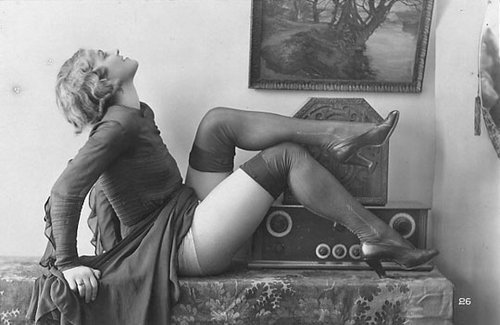
If a woman could keep you inside her by clamping her vaginal muscles in an inextricable viselike grip, you'd be there now.
--Shary Flenniken, National Lampoon
You will find the linguistic elixir of mental succor in totally unexpected places.
The following is something I culled from an article about cheese-and-chutney sandwiches that appeared eleven-ish years ago in Salon, for instance:
Don't tell me that making a quiche can be equally fun, and that cheese is no dinner, because even monkeys know this. It's just that when the ball is bouncing, or everyone's leaving to go swimming--in the dark, when you're stunned and splashing in the bracing ink, and you are the ink, and you find yourself going 'oh, my God, oh, my God" like in that Chekov story--you want your kitchen time to be brief.
--Chris Colin, "Ancient, Yet Edible," Salon

I mean, come on... that's just a paragraph brimming with sheer beauty. Lapidary and sublime. The bad monsters don't stand a chance against it, not even mine.
They will be reduced to staring forlornly at the horizon, lowing in sympathy.

And that's as good as it gets, I think.
You can't control damage. You can survive it, you can even try to gain wisdom out of it--or use it as something against the dull impasto of which joy can be more deeply savored, whenever joy returns to you--but the damage won't be tamped down.
You can't outrun it, either. You will be scathed. The only way out is through.
That's how it works, being alive. Which of course utterly sucks, and I'm sorry it happens that way. I would fix it if I could.
But here's what I always forget, whenever I'm hiding behind a potted palm all dirt-cheeked and orphany in the glamorous-parties-I-don't-belong-at of my mind: you have to tell someone.
Preferably someone who's known you a long time, and likes you anyway. (If you don't have one of those, email me and I'll do the honors. Really. Because absolute strangers have done it for me, many, many times.)
A newish lover is probably not your best bet, and I say that having just burst into tears two nights in a row at three a.m. in this very nice man whom I like a great deal's bed. He was terrifically kind about it, but it's hard not to feel like a total freak in that situation if you are the cryer rather than the cryee.
I ended up discussing that with my pal Andi yesterday afternoon, actually. Apres shrink.
"So, this poor guy," I said. "I ended up totally crying two nights in a row at, like, three in the morning."
"What did he do?" she asked.
"He was extremely nice about it. Said he was happy I felt comfortable crying around him, and that sometimes people just need to leak."
"Obviously a mensch."
"Obviously. But still... I mean, maybe I'm just too damaged. To be around actual people. Like, guy people, especially. It seems patently unfair to vomit up all your shards of glass and lumps of coal into someone else's lap when they had nothing to do with it. I mean totally right up there with whoever threw that Stroh's bottle at Iggy Pop's head at the end of his earlier version of 'Louie Louie.' Not the one where he says, 'A fine little girl's waiting for me/But I'm as bent as Dostoevsky,' and talks about AIDS and homelessness and how fucked up Bush is. The dirty one. That he did with the Stooges, apparently live. Which is actually the only Stooges song I ever liked at all--"
"--You are not damaged," she said.
"Please. I am the fucking empress of damage. I'm soaking in it, like the bowl of Palmolive Madge always had."
"You are not damaged. You have survived a bunch of incredibly shitty circumstances. Which is different."
"It feels like damage," I said. "I mean, especially when I keep bursting into fucking tears and stuff. Who would want to be around that?"
"I would. Every day. In fact I am kind of pissed that you don't live next door, and that you have other friends with whom I have to allow you to spend time. So there."
Which is why I love Andi.
And then we both agreed it's too bad we're not lesbians who are madly hot for each other, because that would just simplify a whole bunch of shit.
A final thought (really! I promise!):
I remember once standing in a long line at the counter of a framing store in Cambridge, Massachusetts. It was the fall of 1997, and that week it felt like everything I had loved in my life was in ruins.

I didn't want to be standing in line, I wanted to slouch back to my car and weep in the parking lot with my forehead against the steering wheel. But I'd already been there for twenty minutes and I didn't know if I could gird my loins enough to come back, so I just blinked a lot and tried to breathe really, really shallowly.
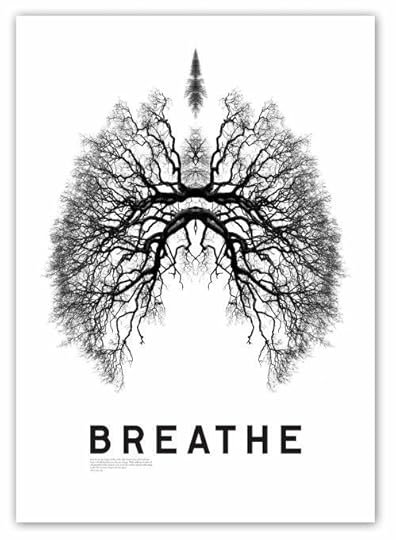
Which is totally NOT what they tell you to do in yoga, but is rather helpful if you're trying not to burst into tears in front of a framing store full of strangers.
So, okay, I was standing behind two women who were just shooting the shit with one another. They started talking about poetry. One quoted a stanza of her favorite sonnet, which was lovely but I don't remember it at all.
The second woman said, "You want to hear my favorite bit of poetry?"
Woman number one nodded.
Woman number two spread her arms wide, closed her eyes, tilted her head back, and intoned:
Ring the bells that still can ring
Forget your perfect offering
There is a crack in everything
That's how the light gets in
And I was just... gobsmacked. Slackjawed. The fever broke and there was this thrill of Lux et Veritas radiating outward from my chest.
The chick opened her eyes and brought her arms down, and I tapped her on the shoulder shyly and said, "Please, who wrote that?"
She laughed and said, "oh, crap, I can't remember! I know it will come to me..."
I gave her my email address. "If it does, will you let me know?"
She promised she would, and later that afternoon I got an email from her.
Two words:
Leonard Cohen.
It's from his song "Anthem."
I liked that verse so much I went home from the framing store and painted it in gold across the back of a chair.
Here's a video of the whole thing from Youtube. It was posted by someone called 7generations with no explanation, and titled
"Singing Leonard Cohen's Anthem deep in the winter of 2010"
I don't know who these people are, but I totally love them:
Take that, imaginary potted palm.
Altars, altars everywhere
By Barbara O'Neal
Recently, I dragged Christopher Robin to a small art gallery in Manitou Springs, where they were having a show of altars. I admired them, one after another, puzzling out their messages. Some were crude and rough, some quite elaborate. CR said, "This is just what you do."
As will so often happen, the obviousness of a thing slapped me in the head. Yes. Of course I do. I make altars out of everything. Altoids boxes are excellent. Cigar boxes. Niches in desks and corners, naturally.
Altars in all forms fascinate me, from descansos erected on the side of the road to honor the dead killed in car accidents, Buddhas covered with dollar bills at my local nail salon, the altars piled high with crutches and requests scribbled on a photograph: "Save Ricardo." A friend and I drove down to Chimayo New Mexico in December, to one of the only pilgrimage sites in North America. There is a deep well with holy dirt that people collect to spread over the sick to heal them of their ills, and an altar to Virgin of Guadalupe, but my favorite is a little stall devoted to Santo Nino, who is a little boy saint dressed in a pilgrim's cloak. He is said to wander the area healing sick children, and wears out his shoes, so people bring him new ones, child shoes. His stall his littered with them, and it's possible to hear the whispers of the prayers rustling the air. Who is more earnestly praying than a mother for a sick child, after all?

Honestly, Santo Nino and his shoes give me the creeps a bit. I really would not want to run into him on a dark night, his cape flapping, his cocky hat clapped down over his hair. He reminds me a little too much of Chuckie.
One of my favorite kind of altars is descansos. Not everyone agrees with me, of course. Many states have fights over when to leave them up, when to take them down. The can be a little creepy, too, I guess, those constant reminders that you are not as safe as you think you are. They are common in Colorado, and in New Mexico, it's against the law to dismantle them. They become entrenched parts of the landscape, as this one has--
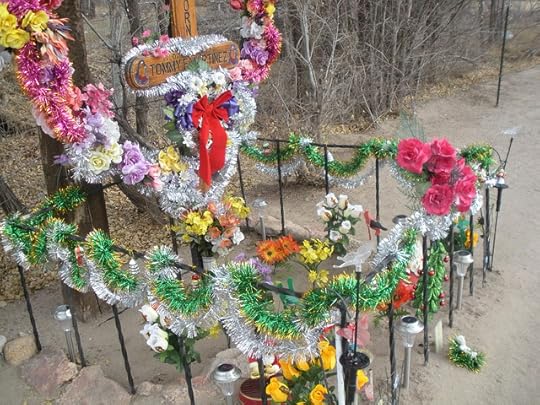
--so well-tended over time that they become a part of their world. It's a loving tribute, a determination to remember the dead as you would wish to be remembered. This one was decorated for Christmas.
I make altars of all sorts all the time. They seem to sprout wherever I am. In my study, there are two. One is tucked into a niche of my desk. It holds blue jay feathers in pottery jars and egg-shaped rocks and a large Ganesha statue piled with American quarters and pound coins and Euros from a handful of different places. Last summer, I added a bottle of water taken from the Chalice Well in Glastonbury, where I waded in the waters to see if it would heal the torn meniscus in my knee. It was not healed but I did manage to walk 100km of the Camino de Santiago afterward, so maybe it was a miracle.

The other altar is quite Catholic in aspect, with a Virgin of Guadalupe covered with rosary beads collected from my travels, and a very special one my teenage son brought back from Barcelona when he went with a class trip. It is he who provided me with the Virgin, whose halo used to light up with laser lights until I lost the cord. Still, she has a pretty face andI like her very much. She holds all the photos of people I give her without complaining.
Altars often make their way into my books, even inspire them. For awhile I was fascinated with the tiny rock star altars that were showing up here and there in tourist shops. When I found a dollar bill that said, "Tupac is alive!" I made one to honor that little bit of magic.
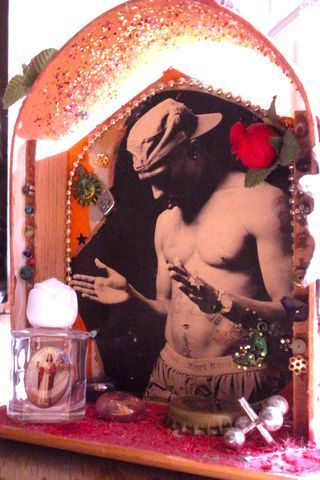
Making it helped me puzzle out the story of a lost young girl in A Piece of Heaven (which has maybe the most magic realism of any of my novels, aside from The Lost Recipe for Happiness). The altar and bill showed up in the narrative. A double descanso in Chimayo helped inspire Lost Recipe. One I saw along the Camino keeps showing up in my new book--crude and cold, but somehow I have not been able to dislodge it from my brain. I would have spent the entire day there, reading the walls and prayers and petitions. It plays an important role in the book.

The day we saw the exhibit of altars, Christopher Robin and I wandered around Manitou afterwards. In an antique store, and he found an old teak jewelry box for $20 and gave it to me for a project. It has Chinese mountains on it, and green Asian fabric inside. There are mirrors, very intriguing. Three days after he gave it to me, I found a passport that had been lost for more than three years, so that went inside. I suspect it will be a travel altar of some kind, but that's not clear yet. We shall see.
I have no idea where this fascination comes from, but maybe we don't always have to know everything. I just love them. That's enough.
Have you ever seen an altar that spoke to you? Do you have a passion for something a little offbeat?
March 24, 2011
The World's Greatest Friend-Making Machine
The World's Greatest Friend-Making Machine
By Nancy Pickard
"Epiphany! I haz one," as a cat might say.
This one's about friendship, upon which I pondered this week, as I drove 130 miles each way to have lunch with an out-of-town friend. She and her husband and a son had driven from Pennsylvania to attend a family wedding in Columbia, Mo. So there I was, motorvating down I-70, dodging raindrops and tractor-trailer trucks, when it came to me, my epiphany.
It has to do with how the internet has utterly changed the landscape of friendship in at least one major way. It used to be that as people got older—and not a whole lot older, really—friendship opportunities narrowed. The internet, bless its convivial soul, has changed all that for millions of us.
I mean, look at us! Right here, right now. Nice to meet you.
During school days, it's easy to make friends if you are the friend-making kind. Not everybody is, of course, and some can't make friends because of circumstances. If you're cripplingly shy, or you're "different," you may walk those halls alone whether you want to, or not.
But for most of us, the lucky ones, the reason it's easy to make friends in school is that we're all thrown together, all day long, for years on end. It's proximity that does it, which is also why it's pretty easy to make friends at work. And when your children are young and you're meeting their friends' moms and dads. And at church, if you get involved in it. And in volunteer work. Etc. While life is pointed outward, toward groups and activities where lots of people flock, friendships blossom.
But there comes a time—or used to—when our friendship tank starts to run out of gas. We get older and people die. We move, and suddenly it's not so easy to make close friends. All those people you'd like to get to know in your new town? They are too busy with their own lives; they already have all the friends they can handle, if not all the friends they might want. If they ignore you, it's not about you, it's about them not having an ounce more time or energy for one more friend, because that means getting to know somebody over a long period of time, and who's got the energy for that any more?
At a certain point, we look around and instead of having too many people to schedule for lunch, we have too few. And then it's hard to start over, like a brand new student, making new friends.
Enter, the solution! Also known as the internet. It's like the world's biggest school, where anybody can enroll, and there are enough people--and enough different kinds of people-- for anyone to find a friend.
Once within its open doors, you find the power of Constant Comment, like the famous tea.
Remember how when the web first started, and we began to hesitantly "talk" to people on line, we were scared of it? They might be serial killers. They might be sexual predators. Be careful! Don't try to meet them in real life! don't give out any personal information! Hide, cover your tracks, disguise yourself. . .
Well, that was impossible, wasn't it?
Those protective walls came down because we connect with people on line just like we do in the flesh. We feel chemistry with people on line exactly the way we do—or do not-- when we meet in person. And so our boundaries began to melt. We began to meet in meat life, and most of us didn't get killed by an ax murderer. Remember that? "You're going to actually meet her? Are you sure that's wise?? What if she turns out to be an ax murderer!"
The internet was our new "school corridor" where the proximity of constant conversation led us into friendship. Just as in school, we joined the Knitters Club, or the Political Club, or the Book Club, and we met people of affinity there, too.
The internet turns out to be the biggest friend-making machine the world has ever seen!
What an incredible blessing this is as people get older (or ill) and lose the physical opportunities for making friends. We retire. We stay home more. We lose income. Etcetera. In times not so far past, factors like those could have—probably would have—left us alone at 90 years of age, and missing people. Now any 90 year old who chats on a website or a blog or a forum can still have buddies. And any 100-year-old, too.
Making friends on line is wonderful, even without anything else added to it, but if we can then meet in person, too? All the better, richer, more satisfying, more--for lack of a better word--completing. Brave new world of friendship meets reliable old world of friendship, and it feels good.
I now have two sweet friends right here in the Kansas City area whom I met on line. One is Victoria, my concert buddy, whom I met on the website of a singer we love. The other one is Cathy, whom I met through a political blog.
The dear friend I drove to Columbia to see? Met her on line.
I've gone to Virginia Beach, Va., to spend a weekend on the beach with seven on-line friends. five of whom I'd never met before. I've had dinner in Seattle with another one, and stayed a weekend with four of them back east. I've met Andi and Jim, from Ohio, and Mary in St. Louis, and Jackie from Denver, and Dina from Moscow. Russia, not Idaho! I've taken a tableful of web acquaintances to a barbeque joint to listen to blues bands here in the KC area. When I go to conventions now, people come up and give me huge or shy grins, and say, "I'm Suzie!" And I realize, with a jolt of happiness, that it's one of my Facebook friends and we're meeting at last.
Instead of my friendship circle narrowing as I get older, it's getting wider and wider, deeper and deeper. How can something wider also get deeper, instead of getting more shallow? It can, partly because of the greater variety of people in my life now, introducing me to new views and viewpoints, and partly because of the synergy of so much talk about so many interesting things. We become greater than the sum of our parts. Just in the matter of age alone, don't you feel as if you are more closely acquainted with more people of more different ages than you've ever been? In one internet circle I belonged to at one time, we ranged in age from 27 to 62. I wonder what the range of ages is here, today, among people commenting and lurking We need one of those poll thingies so we could ask anonymously.
I think all this is going to change, is already changing, the nature of old age in the world. It's invigorating to exchange views, to make friends, to feel close to people, and now we know for sure that we don't have to be in the same physical space to do it.
This blog isn't about being careful out there. We get plenty of those messages, and we all know the rules by now. We also know the horror stories. While I have met a few people with whom I didn't share quite the same chemistry when we met in person as I did on line, that's the only negative I've encountered so far. For the most part, my judgment and instincts about this kind of thing have been good: to whatever degree I click with you here on line, that's probably also going to be how much we click in person.
Invisible web friends made visible!
Haz U got some?
March 22, 2011
Bright-Eyed and Bushy-Tailed
This is a rat.
This is a squirrel.

If this squirrel had that rat's tail, would you still think it's cute?
"God, no!" says Sue Dunlap, who nearly freaked when she saw a couple of stringy-tailed rats chowing down on peanuts she'd left out for her squirrels.
I myself am not enamored of squirrels, a.k.a. "tree rats."
Even though they've never invaded my attic or gnawed my electrical wiring, they are nevertheless deeply annoying. First they steal our pecans and walnuts every fall and bury them all over the yard and in my flower planters. Then they spend the winter digging them up, uprooting the pansies and snapdragons that have begun to bloom in the planters and making holes that can leave the unwary (me!) with a twisted ankle.
Even worse, those nuts that aren't retrieved will send down long taproots in the spring and two or three years later, when they've grown tall enough to be seen amongst the azaleas, I have to wade in with a shovel and try to dig out those would-be trees without destroying the bushes.
According to various studies, squirrels may be more intelligent than dogs. A friend who knows how much I dislike those bushy-tailed rodents, sent me this video as proof of their intelligence.
But our friend Linda Grant is dubious. "Squirrels are the 7th smartest animal? That amazes me and I'm very pro-squirrel. We've had several generations. The original squirrel, known as 'our squirrel' was very bright. His spouse, sadly, was just a cute piece of tail. And his descendants are barely above average."
An MSNBC site claims that "squirrels in California will cover their fur in the scent of rattlesnakes to mask their own scent from predators." Excuse me? This is a sign of intelligence? How many squirrels have lost their lives trying to get close enough to rattlers to pick up their scent? (And who knew rattlesnakes smelled?) Wouldn't skunks be safer and more effective?

Prince Charles has called for the extermination of gray squirrels 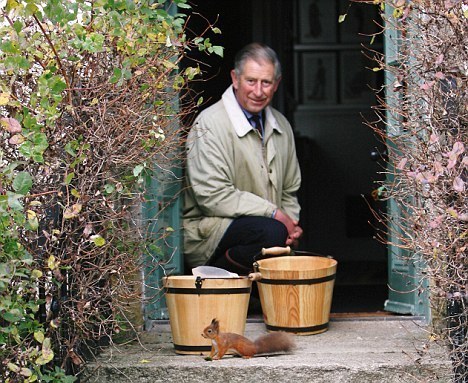 in Great Britain. I'd applaud the prince except that he's doing it to save the native red squirrels. He claims there are only 140,000 red squirrels left in Britain, as opposed to 2,500,000 gray squirrels, and "the greys are giving the reds diseases that will decimate the population." (I don't know who had the bright idea of transporting our native squirrels to Britain, but he's probably first cousin to that "eccentric New Yorker and Shakespeare fanatic named Eugene Schiffelin who," according to the National Geographic, "felt compelled to introduce all the birds of Shakespeare to the United States.")
in Great Britain. I'd applaud the prince except that he's doing it to save the native red squirrels. He claims there are only 140,000 red squirrels left in Britain, as opposed to 2,500,000 gray squirrels, and "the greys are giving the reds diseases that will decimate the population." (I don't know who had the bright idea of transporting our native squirrels to Britain, but he's probably first cousin to that "eccentric New Yorker and Shakespeare fanatic named Eugene Schiffelin who," according to the National Geographic, "felt compelled to introduce all the birds of Shakespeare to the United States.")
 (Which is why we have starlings, but that's a rant for another day.)
(Which is why we have starlings, but that's a rant for another day.)
When I came out anti-squirrel to my friends, Judy Greber, a.k.a. Gillian Roberts, said, "It's time for me to confess that I love squirrels. When I was a child, I had a stuffed squirrel. Not a toy—a taxidermed (?) formerly real live squirrel. I now wonder who the hell purchased and gave me such an inappropriate and yucky thing, but I loved it so much that to my eventual humiliation, I brought it to show-and-tell. Twice. The first time, it was accepted. The second time, I was jeered for......repetitiveness? For squirrel over-adoration? I know they are rodents, but so what?"
"So what?" she asks. So what???
As I suspected, it's all in the fluffy tail. Give a squirrel the tail or a mouse or a vole and then see how many people want to feed it peanuts.
Are you nuts about squirrels? Or is there another creature that annoys you because it has an undeserved reputation for cuteness? (Yeah, zebras. I'm talking about you!) 
Critical Thinking...huh?
Critical Thinking...huh?
By Kathy Reschini Sweeney
 I love teaching. I really do. Yes, I only do it part-time and I teach college students, not little kids. But here is the bad news - these students are starting to scare the hell out of me. And I am not alone.
I love teaching. I really do. Yes, I only do it part-time and I teach college students, not little kids. But here is the bad news - these students are starting to scare the hell out of me. And I am not alone.
Lest you blame any one institution or geographic area, be assured I have discussed this issue with teachers at all levels all over the county, and from an educational standpoint, it's an epidemic. The bad kind.
We all know that No Child Left Behind was less than successful (that is what we call a grotesque understatement, but I don't want this to get political). This generation of kids has been taught to take tests. This means they get an information dump, take a test, then flush it out and start on the next set of facts.
As a result, they do have better vocabularies and I would even venture that they know more things. The problem is that they understand much, much less.
Even the Internet, which gives us access to an incredible amount of information, contributes to the problem, because you type a key word in a search engine, and bloop - another information dump.
But ask them to use the index or glossary in a textbook and they look at you as if you sprouted wings. Ask them a question in a form they haven't seen before, and they cannot apply the concept you thought they learned. Ask them to do actual research - not using Wikipedia - and you get more blank stares than Galliano at shabbat dinner.
I have learned that these missing skills are part of something called Critical Thinking. Basically, it means that if the student does not already KNOW the answer, they have no tools to find it or figure it out.
 Here is an example, albeit a silly one. The following is a true/false question from an exam.
Here is an example, albeit a silly one. The following is a true/false question from an exam.
___ 5. If your fish accidentally poisons your dog, that would be murder.
First of all - yes, it was supposed to be a gift. I normally include a couple of these to help break up the tension of a test and to engage the lighter parts of the brain.
If you don't know the answer, first let me tell you that every semester I teach business law, and we come to the chapter on criminal law, we end up doing what I like to call "Would that be murder?". It never fails. I will ask if there are any question, and one student will start the ball rolling with a question like this: "My Uncle Chucky told me that if you kill someone in your yard, you just have to drag them in the house and say they tried to kill you, and that way it's not murder." (Answer: Not true and have someone make sure Uncle Chucky's gun is locked up, especially once he cracks a six pack.)
I end up giving examples - including ones involving pets - like dogs and fish, to explain the elements of murder. (Hint: one element involves the death of a human).
So how could a kid miss a question like that one? Or - better yet - leave it blank? Easy explanation is that they didn't really read the question. But when I asked them about it, the real story was much more disturbing. As in, they don't read books. They don't know how to use a textbook. They don't even know that you are better off guessing on a true/false question because then at least you have a 50/50 shot, rather than no shot. It's terrifying.
Due to the quirks in regulation, someone like me with a terminal degree (a J.D.) can teach without a degree in education. Fortunately, I did learn how to do research, and this is my current quest. How do you teach kids something that seems to come naturally? I am reading books on critical thinking, and taking some steps, but boy, would I love to get some advice from our TLC community - you know, from people who read.
Help!
March 20, 2011
So Sue Me
By Heather
The answers, please . . . .
The other day, I noticed a strange piece of news. A convict in Ohio, condemned to death for murder, had gone to the chamber for lethal injection. The executioners had difficulty getting the needle into his arm, and the execution was halted.
Now, the condemned man is suing the state of Ohio. Obviously, he's still alive.
I admit, I'm not a lawyer. And I thank God that I am an American, even though I know that our laws can be strange and faulty at times. Our efforts are to preserve the rights of each individual. Human rights—which, of course, must be upheld. We were founded on this principle, and I'm a believer. We all know that torture is wrong, the innocent can be accused, and that the law is a game that only the most learned (and sometimes well-spoken, charming, and manipulative) should play.
But, you can't help but stop and say, "Huh?" that this man can sue.
 My mom, dad, sister, brother-in-law, and step-father all died after or in hospital care. They needed IVs at various times; heck, I've had IVs, and many a time, the healthcare professional had to poke and poke to get a needle in. I've seen bruises all over the arms of those in the hospitals, and, of course, most of the time, it has nothing to do with cruel and unusual punishment, but rather thin veins. When there is trouble, nurses will stop and bring in someone who is an expert. But that doesn't change the fact that a good percentage of Americans has had a bad IV at one time or another, and I'm willing to bet, 97% of the innocent-in-the-hospital did not get to sue over a problem with an IV. We all had our inalienable rights, and did not sue.
My mom, dad, sister, brother-in-law, and step-father all died after or in hospital care. They needed IVs at various times; heck, I've had IVs, and many a time, the healthcare professional had to poke and poke to get a needle in. I've seen bruises all over the arms of those in the hospitals, and, of course, most of the time, it has nothing to do with cruel and unusual punishment, but rather thin veins. When there is trouble, nurses will stop and bring in someone who is an expert. But that doesn't change the fact that a good percentage of Americans has had a bad IV at one time or another, and I'm willing to bet, 97% of the innocent-in-the-hospital did not get to sue over a problem with an IV. We all had our inalienable rights, and did not sue.
But, that's not really my dilemma . . . .
I noted the incident on my Facebook page, and my question was, can we really allow the convicted man's lawsuit to go through? What happened to the human rights of his victims?
I received an indignant answer. Of course, he can sue. If he can't, we're denying him our  constitutional rights. To me, that begins with the right to life, liberty, and the pursuit of happiness. Okay, once you're incarcerated for murder, the liberty part is really not quite there anymore. And it's unlikely you're going to wake up happy in a prison cell, though people do come to peace and learn how to live—and even grow and help others—in prison. In prison, you're not at liberty.
constitutional rights. To me, that begins with the right to life, liberty, and the pursuit of happiness. Okay, once you're incarcerated for murder, the liberty part is really not quite there anymore. And it's unlikely you're going to wake up happy in a prison cell, though people do come to peace and learn how to live—and even grow and help others—in prison. In prison, you're not at liberty.
Back to the victims. What the hell happened to their inalienable rights? Did they have a chance to think about suing the state while they were being raped, tortured, beaten, or murdered?
On a lighter note (if the death penalty can be a light note) we now have lethal injection as our main 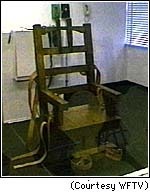 means of execution in Florida. (No Florida bashing here, please, folks. We are working on the voting issue, I swear.) Previously, it was the electric chair; every Floridian has heard the words Old Sparky, and old Sparky was kept at Sparks, Florida. A prisoner went to the electric chair and his hair caught fire. (Why he hadn't had a clean-shaven head, I don't know.) People were outraged that this happened; he had killed five people, including a pregnant woman and child. But we don't believe in torture, and we didn't mean to torture him.
means of execution in Florida. (No Florida bashing here, please, folks. We are working on the voting issue, I swear.) Previously, it was the electric chair; every Floridian has heard the words Old Sparky, and old Sparky was kept at Sparks, Florida. A prisoner went to the electric chair and his hair caught fire. (Why he hadn't had a clean-shaven head, I don't know.) People were outraged that this happened; he had killed five people, including a pregnant woman and child. But we don't believe in torture, and we didn't mean to torture him.
A local paper ran the headline, "Electric chair deemed dangerous!" Some of us scratched out heads, thinking we'd been aware of that fact.
We halted executions until a decision could be reached. I believe you now have a choice of how to go when you're on death row. (I might be wrong on this; fellow Floridians--or anyone--feel free to correct me.)
Ah, but is lethal injection cruel and inhumane?
 Should we bring in the guillotine? That was certainly quick . . . .
Should we bring in the guillotine? That was certainly quick . . . .
Do we abolish the death penalty nationwide? With this question comes another—are we capable of keeping men and women who admit they will kill again in prison? I mean, what is this? Twenty years for white-collar crime and fifteen for murder?
Or, at heart, do we, as human beings, want a man like this ripped to shreds? Or, in our heart of hearts, do we believe more in Dexter—is Jeff Lindsay's success  with his series of books partially due to the fact that we, as a people, can't help but feel that such criminals deserve to die?
with his series of books partially due to the fact that we, as a people, can't help but feel that such criminals deserve to die?
I don't have the answers . . . I hope someone does!
March 19, 2011
Mean Green Mother in My Living Room
In 1990, Don and I bought a house in St. Louis with a new furnace in the basement and a six-foot ficus in the living room. I'd read that ficus benjamina were delicate once you dragged them indoors away from their natural tropical environment. They sickened with mites, mealy bugs and aphids. They hated to be moved. Plant guides said a ficus should be fed, watered, misted and treated like an arboreal invalid.

I didn't have time for that. I dumped water on the tree once a week. The ficus grew into the centerpiece of our drafty living room. All I had to do was pick up a few dropped leaves. I liked a real ficus better than a silk one. It was easier to water a six-foot plant than dust it.
Four years later, Don and I moved from St. Louis to Capitol Hill. By now, the ficus was a family member. Large, quiet and comforting, the ficus never got drunk. It didn't gossip or discuss politics. It silently changed carbon dioxide into oxygen, filtered out poisons in the household air, and grew bigger. I was determined to take it with me.
"Listen, lady," the mover said, "I'm not hauling a seven-foot tree to Washington. It's August. It won't make the 800-mile trip."
"Please," I begged. "It's a tough tree. If the ficus dies, it will be my fault. I won't say anything."
The mover agreed. He told me to tie the branches tight with twine to reduce the tree's width, douse it with water, and wrap it in plastic.
The tree made it. It looked lousy and dropped most of its leaves. But after more slipshod care – water and a dose of fertilizer – it recovered. Soon it spread its green, leafy branches over my livingroom, creating more shady Washington dealings. The ficus was nearly eight feet tall. I transplanted the ficus to bigger pot.
In 1997, Don and I moved to Florida. Once again, the mover grumbled about carting the ficus down the east coast, but I insisted.
Our first Fort Lauderdale apartment was a third-floor walkup with a fine view. I pitied the sweating mover who hauled that tree up three flights. He cursed it all the way. "Down here we trim these things with Weed Wackers," he said. "We don't stick them in living rooms."
"This is a rare Missouri ficus," I said and tipped the poor sap fifty bucks. He left feeling more kindly toward ficus trees.
The ficus dropped leaves after that move, but it soon thrived in the Florida sun shining through the tall windows. A year later, we bought a condo on the beach. The eight-foot-plus ficus went with us. It was too big to fit in our new living room, so we put the tree outside on the balcony.
 The ficus did not enjoy the return to nature. It drooped in the burning beach sun. The incessant ocean breeze stripped off tender leaves. The sea salt browned the survivors. The ficus quit growing. Its top branches were bare.
The ficus did not enjoy the return to nature. It drooped in the burning beach sun. The incessant ocean breeze stripped off tender leaves. The sea salt browned the survivors. The ficus quit growing. Its top branches were bare.
But it refused to die.
When we moved to a bigger condo in Fort Lauderdale, a leaner, meaner ficus went with us. Now it was a mere six feet, with gaping holes in its foliage where I'd cut away dead branches.
The ficus perked up once it was indoors in our new living room. While workers painted and repaired the condo, the ficus recuperated. When we finally settled in, the ficus was once more bushy.
It's lived happily by the window, except for one mishap. Our cat, Harry, climbed the tree at 5 o'clock one morning. The ficus crashed to the floor, knocking over an end table and a clock. Don and I rushed into the room, certain burglars had broken down the door. Instead we found an overturned tree and a terrified cat.
After that, I used Museum Wax, a product yachts and museums use to keep art in place. The ficus had stayed rooted to the spot, growing burlier by the day.
This morning, I measured it. The ficus hits the ceiling at seven feet. It's six feet wide. It needs a new pot, but I'm not sure how Don and I can transplant this monster.
I'd leave it alone, but I'm afraid. 
A Missouri ficus thrives on neglect.
March 18, 2011
True Places
True Places
By Brunonia Barry
It is not down in any map, true places never are.
Herman Melville.
That quote is from Moby Dick, my all time favorite book. It was also the inspiration for the title of my second novel, The Map of True Places, which comes out in paperback this week. As I embark on the paperback tour, I am talking with readers about the true places their lives, and so today I thought I'd share one of mine.
The maps of our lives have changed so much in recent years. There are the usual life changes: people are born, people die, families break apart, new families are formed. Change happens (to borrow a descriptive quote from Hemingway) gradually then suddenly. A few of our sudden changes have radically shifted our perspective: 911, Columbine, Katrina, the financial meltdown. We've recently suffered hurricanes, earthquakes, tsunamis, and a nuclear disaster. This last week the world was literally rocked on its axis.
So how do we navigate our lives when our old maps have become obsolete? The answer, I think, lies in finding our own true places: safe havens that are home to us and make us feel like our better selves. Sometimes these places are real. Sometimes they exist only in memory and imagination. Almost always, they are connected to the people we love.
The truest place in my life is a real one, a Victorian summer-house on a lake in New Hampshire. It was built by my great grandfather more than a century ago and has been handed down through the generations. The camp hasn't changed much in those hundred years, which makes it easier to conjure images of the people who have touched my life there, some who are still with me, many who have long since gone.
Standing in the old fashioned kitchen, I don't have to look far to summon a memory. Over there is the bucket my grandmother gave us to pick blueberries for the pies and muffins she always made. Here is the megaphone my father used to call us back when we swam too far from shore. There's the soapstone sink in the kitchen and the hand-pump we primed at the beginning of every summer with water from the lake. I can still hear the creaky slamming of the back door and the laughing of children as they rush in and out.
In the washroom across the hall, the medicine cabinet door won't close properly. I can see my mother's compact on the glass shelf, and I can see her too, standing in front of the mirror, her lips pursed as she applies Revlon Fire Engine Red lipstick, blots it with tissue, then puts on another coat.
In my true place, my mother still gets dressed to go dancing. She is not confined to her RA wheelchair. My father doesn't shake from Parkinson's. I don't find him scared and frozen in place in the back hall but rather out on the porch playing with the dogs or pitching horseshoes with the uncles. My grandmother, gone many years now, is still the outspoken matriarch who so frustrated her son-in-law, my father, that one day he locked her in the pan closet in the kitchen and wouldn't let her out until she promised to be nice to him, which she was from then on.
In my true place, I can bring all of the generations back to life at once. My reverie supposes that time is non-linear, and that all the characters exist in their happiest moments. People who never knew each other gather together for a weekend celebration. A favorite uncle who read stories to me when I was little reads the same stories now to my brother's grandchildren. My first dog, Skybo, rolls on the front lawn with my sixteen year old golden retriever whose hip dysplasia has miraculously healed. Pine needles hang from their ears, and moss sticks to their muzzles. My grandmother sits on the front porch shelling peas with the great granddaughter she never knew.
My true place is always sunny and warm, except at about 4PM each day when a quick thunderstorm follows the curve of the White Mountains and moves swiftly across our little lake. We giggle and run for cover. The storm disappears as quickly as it has come. There may or may not be a rainbow.
We gather for dinner around the big oak table in the dining room, under the clock that has ticked the minutes away since the day the camp was built. When I was a child, the sound seemed so loud that it sometimes kept me from sleep. These days, its ticking is just as loud, I am told, but I cannot hear it unless I'm in the same room. The sixteen-inch rainbow trout my grandfather's brother caught when he was a young boy is still mounted above the door, and the piano, always off key from the cold that sets in after Labor Day, still sits un-tuned in the corner by the window.
After dinner is over, my grandfather goes to the piano and plays any tune we can think of, in any key, and my aunt sits on top of the piano belting out God Bless America in her best Kate Smith. After that, we play canasta or go for a late swim. The little children fall asleep on the rug where they have dropped from exhaustion and have to be carried up to bed.
My truest place, though real, has the luxury of fantasy. I am, after all, a fiction writer. Fantasy has always been easier for me than reality. Still, this place, with all of its reflected memories, is more real to me than anything in my everyday world, and I hold it in my heart. If all goes well, the family will gather here again next year, and it will, summer after summer, become a true place for the next generations.
Whether real of imagined, true places are more important than ever in these times of great and sometimes devastating change. I wish for true places, real, imagined, or simply remembered for all those who are suffering today.
I've told you about the place I hold dear. What are some of your true places?



